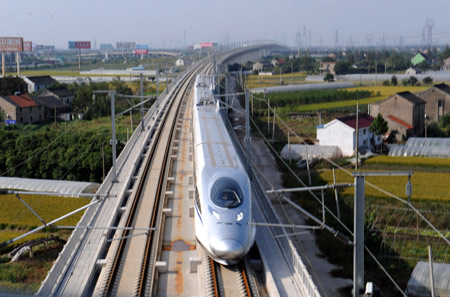Economy
High-speed rail expands
By Shi Yingying (China Daily)
Updated: 2010-10-27 11:31
 |
Large Medium Small |
|
 |
| A bullet train runs on the new Shanghai-Hangzhou rail line on Tuesday. [Photo/Xinhua] |
Some argue the price is too high
SHANGHAI - Two bullet trains simultaneously set off from Shanghai's Hongqiao Station and Hangzhou Station in Zhejiang province at 9 am on Tuesday, inaugurating China's latest high-speed rail link.
The new high-speed line between the two eastern cities also marks the latest milestone in China's effort to build the world's fastest rail network.
Trains on the line will travel at an average speed of 350 kilometers per hour, shaving 33 minutes off the 202-km journey, which previously took 78 minutes.
The price of a first-class ticket for the nine-stop trip is 156 yuan ($23.4), while a second-class seat costs 98 yuan.
The new link brings the length of China's high-speed rail network to 7,431 km - the longest in the world and more than three times that of Japan.
Last month, the Shanghai-Hangzhou high-speed line stunned the world when a train hit a speed of 416.6 km/h in a trial run, a world record.
"The operation of the new rail line will help alleviate traffic pressure in the Yangtze River Delta region," Minister of Railways Liu Zhijun said at the inauguration ceremony.
The ministry has forecast that passengers will make 3.05 billion trips in and out of the Yangtze River Delta in 2010, with the figure jumping to 5.5 billion in 2020.
China aims to make its high-speed rail network the longest in the world. According to the ministry, China will have a rail network of 110,000 km by 2012, 13,000 km of which will be high-speed lines.
The plan includes a high-speed rail link between the capital, Beijing, and the financial center, Shanghai. Currently under construction, the 220.9 billion yuan line is scheduled to open in 2012 and will cut the travel time in half to less than five hours.
Many passengers on the inaugural journey from Shanghai to Hangzhou on Tuesday marveled at the speed of the train.
Zhou Caoying, 61, pointed with excitement as the display panel showed the train reaching 356 km/h. "I feel very proud of China's achievement," she said.
A survey conducted by the Shanghai survey platform smmail.cn shows that 84 percent of 2,500 respondents found the price of travel on the new high-speed line to be high, while only 10 percent regarded the fare structure as "fair and acceptable".
The price of a first-class ticket for the regular train costs 64 yuan, almost half the price of one on the high-speed line, though the journey takes 33 minutes longer.
"It'll cost me an additional 6,000 yuan a year if I take the high-speed train each time I travel," said 26-year-old Wu Sheng, who makes a round trip between Shanghai and Hangzhou every couple of weeks.
"I like the concept of a high-speed train because it saves time, but it is not worth the extra cost for a short journey," Wu said.
Many travel agencies that offer short trips between the two cities agreed. "We've calculated the costs carefully and it is only reasonable to take a high-speed train on trips between cities that are more than 400 km apart," said a member of staff at the Shanghai Travel Agency.
Eighty round-trip trains now run daily between Shanghai and Hangzhou, 50 of which are on high-speed lines.
Xinhua and Reuters contributed to this story.



